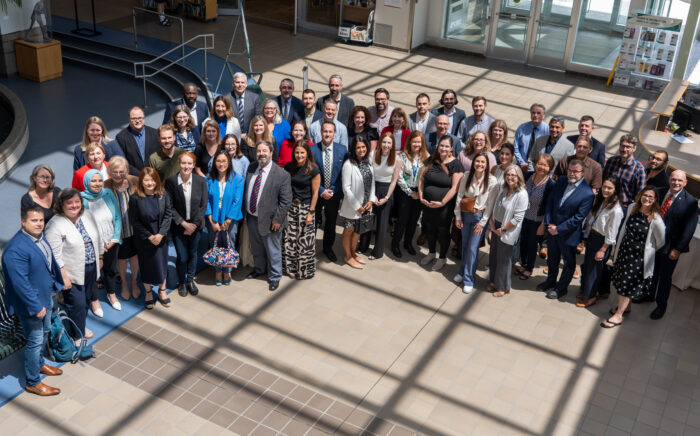Inspiring New Leaders and Driving Innovation for the Next Generation of Trucking Professionals
Posted on December 06, 2023
Though everyone felt the disruption during the pandemic years, the transportation industry experienced perhaps the most significant shift. Exponential demand growth, supply chain bottlenecks, economic and political factors, rising fuel costs, and a global talent shortage forced carriers to adapt quickly.
Agility remains a critical factor in success, especially for the trucking industry, which continues to struggle to overcome challenges amidst rising costs and market decline.
Technology remains the most viable solution to address top-tier issues, helping trucking professionals streamline processes, reduce documentation errors, improve communication between stakeholders, and generally mitigate organizational risk.
“The trucking industry is a complex and constantly evolving sector. Whether that’s dealing with shifting economic and inflationary impacts, regulatory changes from a labour, tax, environment, or truck safety perspective, adapting to a changing workforce, or our efforts to promote the industry’s image and recruit new talent, it’s imperative that the next generation of leaders in our industry remain engaged and have a valuable platform to have their voices heard on important issues in our industry,” says Stephen Laskowski, President of the Ontario Trucking Association.
What’s Going on in Trucking Today?
Some of the top issues affecting the trucking industry include:
Talent Attraction, Development, and Retention
Talent acquisition for all positions – driver and non-driver – is fiercely competitive. When considering employment, the industry must show its best assets: amazing people, great benefits and promising career paths. Reaching the right demographics such as Gen Z, establishing a trusted employer brand, and focusing on retention strategies are vital to a trucking company’s success.
Digital Transformation and Technology
Technology like automation, artificial intelligence (AI), third-party logistics, and warehouse management systems (WMS) are the solutions to many issues plaguing the trucking industry today. From bidding on loads to communicating with customers, managing multi-modal shipments, mapping routes, classifying freight, customs clearance, compliance, and all necessary documentation, the right software is genuinely transformative, making it possible for trucking companies to stay profitable, compliant, and keep customers happy. As logistics gains complexity at every link in the supply chain, technology reduces errors and streamlines processes for trucking professionals so they can focus on higher-value tasks.
Transition from Diesel Vehicles in a Carbon-Regulated Future
The trucking industry faces massive challenges with federal and international regulations moving towards net-zero emissions goals and stringent carbon regulation. Pressure is mounting from regulatory bodies and customers, and companies must now report direct and indirect emissions from their activities. Transportation is under the microscope and ripe for transition to electric. At the same time, shippers that outsource will begin to look at alternative modes or choose companies that can offer cleaner transportation or carbon offsets.
Productivity Pressures
Despite high demand, staying productive isn’t as easy as it sounds. Maintenance issues, production delays, supply chain disruption, ballooning costs, recruitment challenges, driver shortages, compliance issues, the introduction of ELD’s and volatile regulatory frameworks are a minefield of distraction, taking valuable time and attention away from revenue-building activities. Without forward-thinking management, automation, and process optimization, these concerns can easily result in a business downturn, poor customer service, and employee burnout or people leaving the industry
Last-Minute Deliveries
Last-minute deliveries have changed how companies think about logistics and supply chain management. As same-day and last-mile delivery grows in popularity, the average length of a long haul has decreased by 31%. Ultimately, this is what trucking companies are competing with. As the expectation of quick and efficient last-minute deliveries grows, customers have come to accept its service level as a standard for all to follow.
Skills-Focused Solutions
Trucking has been keeping our economy growing since trucks were invented. Whether the market was up or down, trucks were a lifeline, delivering goods to people across the country, often in areas that rail transport could not reach.
Though society evolves and consumer preferences shift, trucking continues to be the most crucial mode of domestic freight transportation based on accessibility, cost, and reliability. In fact, there is almost nothing in Ontario not delivered by a truck.
There’s no question that logistics has faced the greatest disruption of any industry in recent years. Many innovations and new ways of thinking have come to light that solve current challenges, but to ensure they are implemented in a way that supports companies and customers, we must continue to improve through learning, thought leadership, and community.
Emerging leaders in the trucking industry must gain critical skills to lead in this VUCA (Volatile, Uncertain, Complex, Ambiguous) reality with vision, understanding, courage, and agility. These include:
- Autonomous Transportation, including knowledge of emerging technologies and development of frameworks aligned with business goals, budgets, and projected trends.
- Sustainability encompasses environmental impact, business longevity, and financial viability.
- Talent and Skills shortages must be addressed, requiring a human-centric, competency-based hiring approach that increases the talent pool through targeted immigration policies, funding skill-building educational programs, and attracting Gen-Z candidates for non-driving roles.
OTA and Schulich ExecEd’s Leadership Programs
Schulich ExecEd’s OTA-Schulich ExecEd Leadership Education & Development (LEAD) program teaches emerging leaders in the trucking industry critical skills to lead the trucking industry into a more sustainable future.
“The partnership between Schulich ExecEd and the Ontario Trucking Association (OTA) is a testament to our shared commitment to shaping the future of the trucking industry. The OTA-Schulich ExecEd Leadership Education & Development (LEAD) program creates a solid path for emerging leaders in the trucking sector to follow to success. Since 2017, this partnership has thrived, with the LEAD Certificate Program earning recognition as the most prestigious in the industry,” says Rami Mayer, Executive Director of Schulich ExecEd. “Our collaboration with the OTA has been instrumental in graduating over 100 trucking leaders, empowering them with the critical skills necessary to navigate the challenges of the industry. This partnership provides a transformative learning experience, where the best professional developments meet the cutting edge of industry expertise, unlocking new frontiers of leadership excellence for the next generation of trucking professionals.”
“The goal of our LEAD programs has been to drive awareness, engage, inspire, and develop the next generation of professionals in the trucking industry. The partnership with Schulich has been a major part of this success through their innovative programming, first-class facilities, and instructors. We look forward to continuing this great partnership and building upon this success to the benefit of our members in the years to come,” says Lak Shoan, Director of Policy and Industry Awareness Programs at the Ontario Trucking Association.
The program addresses significant challenges in the industry, such as resistance to change, why innovation is essential, and how to leverage cognitive diversity and problem-solving frameworks for better outcomes. The program introduces specific tools and techniques needed to creatively solve complex problems in collaboration with others. Participants are put into diverse teams to critically look at the trucking industry challenges and provide solutions for consideration to OTA Board members.
“Through the program, participants learn to think better, solve challenges systematically, collaborate, and consider issues beyond their normal scope of work. Importantly, they can dream up better solutions for the industry as a whole. You can see the shift from the beginning of the program to the end, and in the years that follow. The capstone action learning project has a way of solidifying the learning while creating lasting friendships,” shares Megan Mitchell, Program Director of the OTA-Schulich ExecEd LEAD Certificate Program.
We aim to inspire new leaders, attract and retain talent, and bring innovative ideas to the sector. Today, the program focuses on these core objectives, equipping present and future leaders with the frameworks and insights needed to lead strategic projects and find new ways to create value for their customers and organizations.
“Enrolling in the OTA-Schulich ExecEd LEAD Certificate Program has been an eye-opening journey that has significantly shaped my approach to leadership within my business. The program’s focus on understanding different thinking styles and leadership methods has been instrumental in redefining how I navigate challenges and foster growth within my organization. Learning about diverse thinking styles and their impact on problem-solving was a pivotal aspect of the program. Gaining insights into the strengths of various thinking approaches—analytical, creative, strategic—has broadened my perspective on decision-making processes,” says Matthew Matti, Director of Sales at SK Cornerstone and graduate of the OTA-Schulich ExecEd LEAD Certificate Program. “I am incredibly grateful for the wealth of knowledge and practical strategies gained from the OTA-Schulich ExecEd LEAD Certificate Program. The newfound understanding of different thinking styles, adaptive leadership methods, and the importance of trust-building in organizations will undoubtedly serve as cornerstones for driving positive change and sustainable growth within my business. I wholeheartedly recommend this program to any leader seeking to broaden their leadership repertoire, foster a culture of trust, and achieve impactful results within their organization. I myself have learned quite a bit, and have built friendships that will be lifelong.”
The program’s in-depth exploration of various leadership methods was truly enlightening. From transformational to situational leadership styles, each module provided practical insights into their applications. I’ve been able to tailor my leadership approach based on situational demands, empowering my team by providing the necessary guidance while also allowing autonomy when appropriate. This adaptive leadership style has proven effective in enhancing team morale and productivity.
All industries must adapt to changing times to maintain profitability and continuity. Schulich ExecEd’s OTA-Schulich ExecEd LEAD program is proud to support the next generation of leaders in trucking and transportation with the skills and insights they need to make our future more sustainable.

Related Articles

Three Leadership Lessons from Movie Production
June 17, 2024
Unlocking the Future: Empowering Municipal Leaders in Ottawa Through Strategic Partnership / Déverrouiller l’avenir : accroître le pouvoir des dirigeants aux dirigeants municipaux d’Ottawa les moyens d’agir grâce à un partenariat stratégique
June 12, 2024










